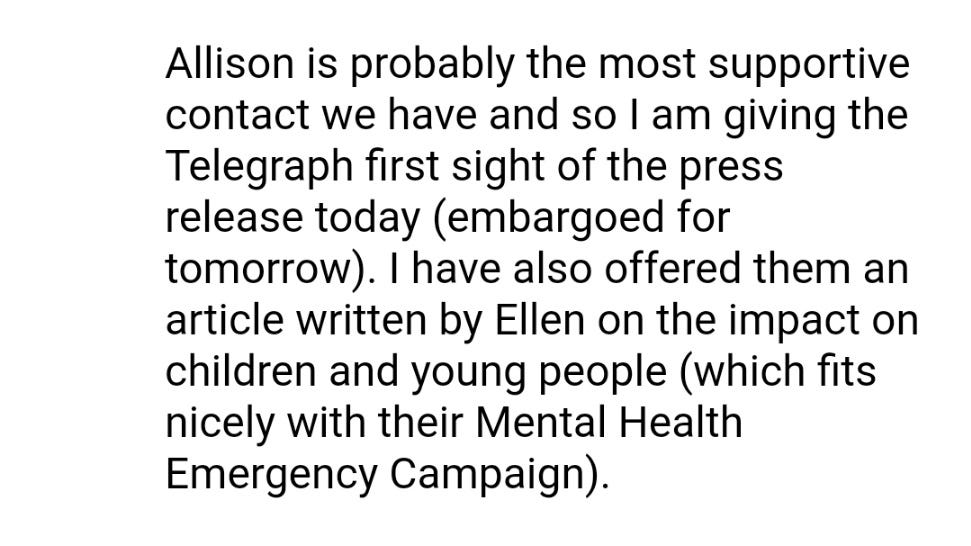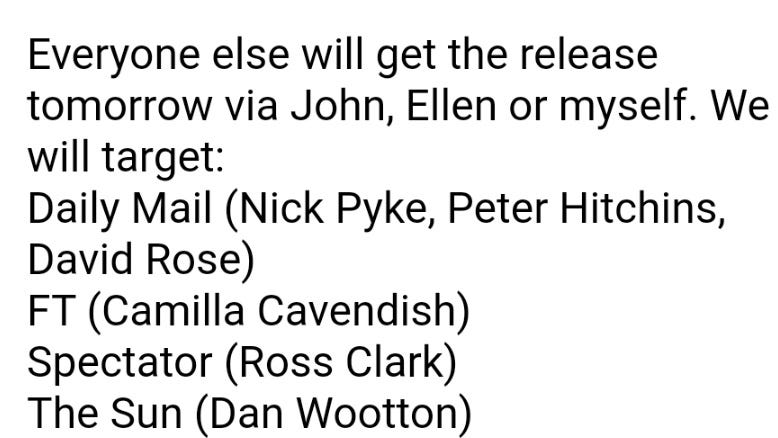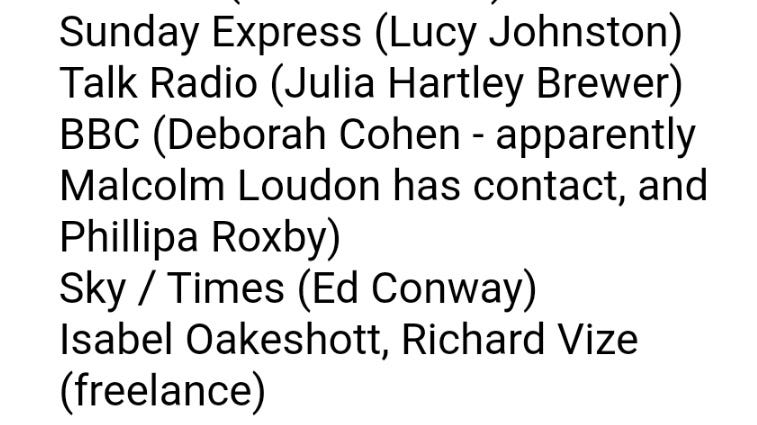The New York Times has recently published an article regarding unwanted sexual advances from columnist Nick Cohen, then at the Observer, now at the Guardian. The accusations have become just part of a wider story as its been revealed a journalist working at the Financial Times had a story on the accusations quashed.
This example highlights a wider issue regarding journalism in the UK.
While much of the media like to take on the role of moral arbiters in public discourse, their own standards often fall below what the public deserve. The phone hacking scandal and the Leversom Inquiry that followed exposed criminality, the Sun's coverage of the Hillsborough disaster demonstrated a willingness to lie in order to smear an entire city and in recent years the culture wars has led to the mainstreaming of misinformation and disinformation.
Although the BBC comes under constant criticism, media titles and those working for them have a tendency to avoid reporting and coming into conflict with their peers. The intertwined nature of Westminster and Fleet Street has also led on many occasions to a failure to inform the public of relevant information because it would bring unwanted attention to journalists.
With the current battle between the Cabinet Office and the Covid Inquiry over Johnsons diary and WhatsApp messages the pandemic provides a number of examples of where elements of the media appear to have chosen to protect their own over informing the public.
Dominic Cummings’ wife Mary Wakefield, a journalist and commissioning editor for the Spectator wrote a piece about her worries for his health when he had covid but failed to mention the infamous trip to Bernard Castle.
When Boris Johnson’s press secretary Allegra Stratton resigned after footage emerged of her joking about a Christmas Party in Downing Street it seems unlikely that her partner James Forsyth, then political editor of the Spectator would have been unaware of the event. Forsyth was best man at Sunak’s wedding and now works for him in Number 10.
While the cosy relationship between client journalists and their respective political factions can fracture at times due to some stories being like partygate being too big to ignore once the headlines do break, Fleet Street seems less willing to take on their peers.
After receiving a phenomenal scoop in 2021, I have wondered if my own experiences of resistance from editors in getting the story the attention it deserved was because although the leaks demonstrated active efforts by politicians to undermine public health measures it also showed the involvement of journalists at many major outlets.
The HARTleaks
Established at the start of 2021 the HART group is a UK offshoot of Pandata, an international collection of those involved in producing alternative facts on the pandemic. In the summer of 2021 a handful of campaigners received an archived copy of HART’s entire Rocket chat logs, revealing a coordinated disinformation network of organisations where HART provided certain journalists and the Covid Recovery Group of predominantly Conservative MPs weekly briefing documents proving them with alternative facts and studies produced by the disinformation network to argue against measures and child vaccination.
The emails that reveal MPs collaborating with conspiracy theorists & anti-vaxxers
Officially established in October 2020, the Covid Recovery Group (CRG) is the covid sceptic wing of the UK’s Conservative Party, operating as a party within a party like the influential European Research Group (ERG), it also contains many of the same key individuals such as Mark Harper and Steve Baker, who likes to take personal credit for the removal o…
HART’s launch meeting shows how much of the UK’s news outlets were represented.
Internal chats reveal UK print media's role in promoting disinformation
In the US we see disinformation groups like America’s Frontline Doctors being embraced by Republican politicians, while some disinformation doctors are even running for office like Scott Jensen ( Pandata and World Doctors Alliance). This isn’t surprising considering a leaked conference call shows the shadowy Council for National Policy (CNP) was respons…
A big story?
The HARTleaks were first reported by Logically and Daily Dot.
The Byline Times is the only other outlet to have properly covered the HARTleaks in detail.
The BBC did reference the HARTleaks in a piece covering pamphlets being handed out by abusive anti-vax protesters at school gates.
The leaflets had been produced by the Safer to Wait campaign, a group that was a direct offshoot of HART and the anti safety measures in schools group UsForThem. The campaign included a range of dangerous disinformation including the suggestion children could be given ivermectin as an alternative to being vaccinated. The details of how this group was set up are included in the HARTleaks, alongside Safer to Wait Ros Jones of HART and UsForThem also set up CCVAC.
Molly Kingsley the founder of UsForThem is a Telegraph writer, she founded her organisation with the aid of fellow Telegraph writer Alison Pearson, she also writes regularly for a number of papers and outlets, and used to appear in regular interviews across broadcast radio and TV.
After the BBC reporting on anti-vax leaflets Kingsley tried to shut down any association of herself with the Safer to Wait campaign, even threatening to sue the epidemiologist Dr Deepti Gurdisani for sharing a thread of mine on Twitter. Deepti is still waiting to receive a letter from Kingsley’s lawyers because when UsForThem went through their social media timeline deleting reference to the Safer to Wait campaign they missed several tweets and the Telegraph website still has an article written by Alison Pearson where she interviews Ros Jones of HART about why she set up the Safer to Wait campaign on behalf of UsForThem.
Lawfare: Court Room PR
Lawfare: A Multi-Pronged Strategy A common strategy for many years in the US used by the likes of organisations linked to the Council of National Policy and Koch network is litigation; they have the money and legal teams available to constantly bring legal challenges against policies they disapprove of. Once again being right isn’t important, and when it…
While not reporting on the HARTleaks directly The Times’ Tom Whipple has done some great reporting on the links between certain Conservative MPs and anti-vaxxers and conspiracy theorists.
Considering the HARTleaks contained a treasure trove of information regarding coordinated disinformation Fleet Street editors weren’t interested in their contents. The BBC misinformation unit even has a copy of the leaks but no further reporting has occurred.
A report for the Observer
In the autumn of 2021 myself and two other journalists were offered a paid commissioned by the Observer to produce a report on the HARTleaks. We produced an extensive network map of linked disinformation groups based in the UK and abroad, media outlets and politicians, known funding streams were also included. The report identified key individuals and organisations in the network and provided examples from the HARTleaks regardings how disinformation was produced and slipped into mainstream media.
The report was so extensive the Observer proposed to run the piece as a two part story timetabled to be published over two days of Christmas week. Considerable work was done by the three of us, a rate for remuneration was set and the final version was sent to the editorial team.
The report wasn’t published, it was pulled without warning or explanation. Meanwhile an academic friend’s article which looked at misinformation was picked apart by another newspapers editorial team to the point where the final version was almost unrecognisable.
Were editors worried about legal action? UsForThem in particular have been quick to threaten litigation against the government, schools and threatening people with defamation cases. HART had accused the source of the leaks of having obtained them through illegal hacking, however this was in itself an example of disinformation, HART had simply failed to make their chats private, meaning someone else with a Rocket account was able to login and copy their logs.
The Byline Times didn’t face any legal action for its reporting on the HARTleaks, neither had DailyDot or Logically. The BBC had received a number of complaints but had the evidence to back up their reporting. Myself and others who have been accused of defamation received legal letters, however a complaint was made to an organisation I was representing at the time, it was dismissed as being invalid. Fear of legal action seems unlikely.
The role of mainstream media is an essential part of the HARTleaks, and it casts considerable doubts on the quality of journalism and editorial work of the UK media. Were editors worried about setting off a metaphorical bomb in Fleet Street?
Platforming Conspiracy Theorists
The HARTleaks laid bare the process by which large sections of the media generate stories, in particular those that would be classed as culture wars content. An astroturf organisation or think tank produces a report or case study, without checking the accuracy of the report a journalist writes up the article including a quote from the organisation. This then puts the story into the headlines and the organisation is able to pick up a number of secondary interviews with friendly politicians also providing quotes and then asking questions in parliament and/or the media to generate a second wave of articles.
All of this is fairly well known, however the HARTleaks showed just how closely connected certain journalists are to these astroturf groups. The journalists will know just how extreme some members of these groups are in private and will be aware of those who entertain conspiracy theories, and yet they still look to find ways to platform and amplify these organisations and groups, knowing that they are potentially sending readers down a rabbit hole.
We see this with the number of RW commentators and journalists, particularly those involved with the Spectator were present at the anti-vax event hosted at the Carlton Club by conspiracy theorist John Mappin, founder of Turning UK, Andrew Bridgen and Aseem Malhotra.
Anti-vaxxers Party and Plot the Path to Nuremberg 2.0
History is written by the victors, or more accurately, history is rewritten by the victors. QAnon John's Antivax Party John Mappin is the founder of Turning Point UK, the culture war sister organisation Turning Point USA founded by Council for National Policy member Charlie Kirk.
The HARTleaks demonstrates the willingness of sections of the media to platform disinformation, it also highlights the failure of other sections of the media to call this out. We see this with the platforming of all sorts of opaquely funded organisations who are interviewed as if the are independent experts without being questioned regarding who they represent.
The greatest recent example of the willingness to platform lies is the Dominion voting machines legal case against Rupert Murdoch’s Fox news which provided undeniable evidence that the network knew it was promoting disinformation regarding the 2020 presidential election. The fact Murdoch was willing to see the foundations of US democracy undermined should have been a far bigger story in the UK, raising questions regarding if he was a fit and proper person to be in control of a sizeable section of the UK media.
A morning TV presenter having an affair with a younger colleague has received more coverage in the past week that the undermining of US elections that led to a deadly riot on Capitol Hill.
Beyond shared distraction, and ignoring the actions of their peers there are also times when the UK media acts in a group mentality. In March 2020 most of the media simply tried to sell the public the herd immunity strategy rather than provide scrutiny. Freedom day and the Living with Covid strategy without question as has the decision to end the vaccination programme for the majority of people.















